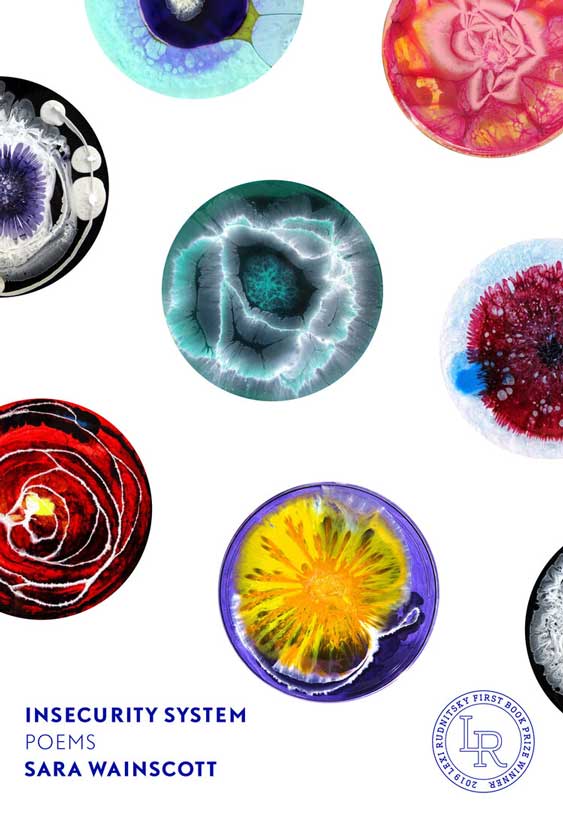Sara Wainscott
Insecurity System
Persea Books, 200
Paperback, 88 pgs
One holds their breath at the end of a line in Sara Wainscott’s Insecurity System (Persea Books, 2020) like they’re watching a ball fly toward the target next to a dunk tank. A thrill no matter what? Her phrasing often arcing to danger, sometimes becoming softer in descent—with humor, with revelation, terribly wise. Like the security system referenced in the play of the title, these poems hold the promise of alarm, a sense that the speaker’s vulnerabilities are so prevalent and cherished they’re organizable, which they are!, in ye olde “system” of a sonnet, or more specifically the four sonnet crowns that comprise Wainscott’s debut collection. “I used to keep my problems to myself,” she writes in the eighth point of “Spaceship” (a crown upside down?):
but now I have a therapist who says
you must be open to the world.
Opening up makes me feel gut-shot
but expert advice is expensive
so I take it.
It’s the impression of a slowly roiling routine unease that creates glorious, droll tension in Wainscott’s line breaks. She’ll snap an idea in half for the music of the form, of course, but also a good joke (“I must try to have sex / dreams in which I contribute more vigorously”), the grace of a perfectly timed shift in significance (“For roses I feel a reverence / usually reserved for the dead. The dead / don’t like me much—they’re sick of flowers”), or several content-animating gestures at once, such as in a poem from “Flowerish,” which considers the overwhelming emotive and physical flow-state of new motherhood via enjambments ending in a series of punchy punctuated end-stops:
A summary in flowers of my feelings
could overflow a field. Out for a breakfast
of cinnamon toast I
overflow again […]
What’s bone is bone.
The rarest rose cannot be found.
Petals pressed, and then more pressure.
Bowels evacuated during labor.
Pairs of legs flung rowdily around.
There’s little more pleasurable in a book of poetry than a good line broken, oozing wild lyric nutrients (“I // overflow”), cracking open that gap of panic, the lunge forward into the next line’s zap. And the rhymes! As in the excerpt above, “bone” and “rose” push strong and hard and classic against the more flexible “pressure” and “labor,” all singing the (fucking) insanity and (infinite) expansion of childbirth. A sonnet sets you up for this dynamism, but Wainscott doesn’t miss an occasion to create (or notably withhold) sonic complexity with speed and intelligence, following the laws of the form that suit her mind’s movement. Insecurity System’s music is flexible and persistent, as are the images; the materials that comprise these poems are ancient, beloved, and familiar—stars, roses, clouds, death—and the subject matter is common (communal) too: an ailing parent, angst re: motherhood, a life’s supposed worth among the dull drool of another packed afternoon, work, money, memory, ire. One appreciates in Wainscott’s lines, as in life, the ordinary as a furious engine of originality. Here, clouds “illustrate / the air’s colossal control,” they “feel no sense / of obligation to the sky,” they are “weighted / from within by worms,” and “puff,” “paste-colored” while the speaker stuffs her mouth with marshmallows, a too-sweet treat, a clowning cloud, silencing. Wainscott’s language dwells in well-known metaphors and symbols, desiring both that a beautiful vision bloom anew and, at the same time, that it stop:
How transparent the stars appear.
How obdurate their want.
Why should roses have to mean?
Making meaning leaves out far too much.
In these poems, meaning making (like work, like parenting, like love) is so futile, so necessary, never enough: “if I am a horse / for work I want to work,” Wainscott writes, “if I am a horse for show I want to show / beautifully.” One of the joys of Insecurity System is watching the poet’s mind—this specific consciousness is drained by caretaking, by longing, by the taxman—come alive; this mind alights by engaging what has historically been the language of the (blerg, boring, sorry) patriarchy, as the form of the sonnet is one that traditionally, until recently, with a few exceptions, would assign this particular speaker (daughter, woman, mother) the role of muse instead of musician, the plight of the beloved over the lover. Wainscott’s sonnets simultaneously hold the observations and insights of their complex contemporary speaker’s attention (jam sandwiches, zebra panties, thesis statements, dog shit, sleep, sex, the beach), and translate a bristling energy, an instinct to resist expectation (mirrored by the flexibility of the form), to escape certain gendered labor, to shoot the moon, to run away and live on Mars.
The most exciting sonnets have always been boisterous, social, inclusive (Shakespeare, St. Vincent Millay, Berrigan, Coleman); it’s an excellent structure for a poet both deeply controlling and existentially casual. Like a clock made of fire (oh, the sun) or an internal calendar (ah, the heart), a sonnet’s meant to measure and provide physically energizing pressure. The crowns in Insecurity System include many influences and echoes—Sylvia Plath, Bobby Day, Bruce Springsteen, Frank O’Hara, Freddy Mercury, John Milton, Lana Del Ray—and are in conversation with recent experiments in the form such as Nikki Wallschlaeger’s Crawlspace, Lo Kwa Mei-en’s The Bees Make Money in the Lion, Hanif Abdurraqib’s The Crown Ain’t Worth Much, or Diane Seuss’s forthcoming frank: sonnets (see also Dora Malech’s excellent series on the sonnet in The Kenyon Review).
Wainscott’s choice of form acts as correspondence between generations (artistic and private), a kind of psychological process against forgetting, which is a frequent fear in these poems. “The law exists against forgetting,” Wainscott writes, “I will get what I pay for / and then I must continue making payments.” These poems often make reference to an ill parent, small children, a city’s citizens, or students, all of whom experience time in different ways, all of whom require a different kind of alertness and attention on the part of the speaker. Important to Insecurity System is the difficulty of balancing caregiving and creativity; the mind, pulled in so many directions, “can be a fence, a code,” “locationless,” “an insecurity system,” or “blank, black and low / pulled into the gravity / of a collapsing star.” One stunning unbroken couplet appearing partway through the third poem in “Spaceship,” is followed by an exhausted, tender, and illuminating heart-straining anger:
I am tired of minding for those who do not mind.
Tiredness is not much reason to give up.
There is no rightness like a rose.
Tipped into a hole, the ailing brain
shoots the family marbles.
Circles the drain.
Cue the rage of any reasonable person.
In this collection, in the span of a single crown, death is both action and inaction (“there’s time enough for that”), while a rose suggests tribute, trophy, genitalia, and motivation. “Two things can be just alike,” Wainscott writes in “The Supernatural Violet Blues,” the final poem of the book, “but it’s a mistake to think that you can tell.” Early in Insecurity System, Wainscott mentions a still life as something that “lends plain old shit a sense of perfection,” and the reader understands this observation as a metaphor for what her chosen form can do too. A sonnet can be curated, refocused, and arranged, but there’s always chaos. If, as Wainscott does, one starts their day with a sonnet in mind, their life will change: it will barrel toward the exhilarating explosion of a volta.

About the Author
Caryl Pagel is the author of two collections of poetry: Twice Told and Experiments I Should Like Tried At My Own Death. Her first collection of essays, Out of Nowhere Into Nothing, will be published in fall 2020.
